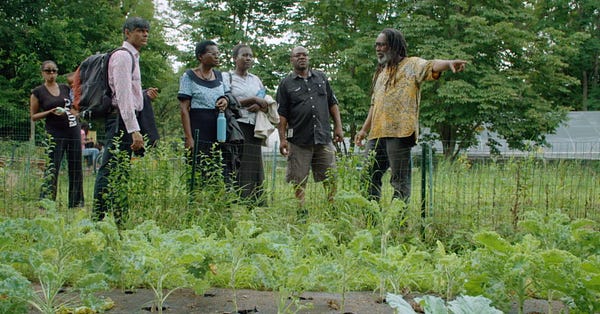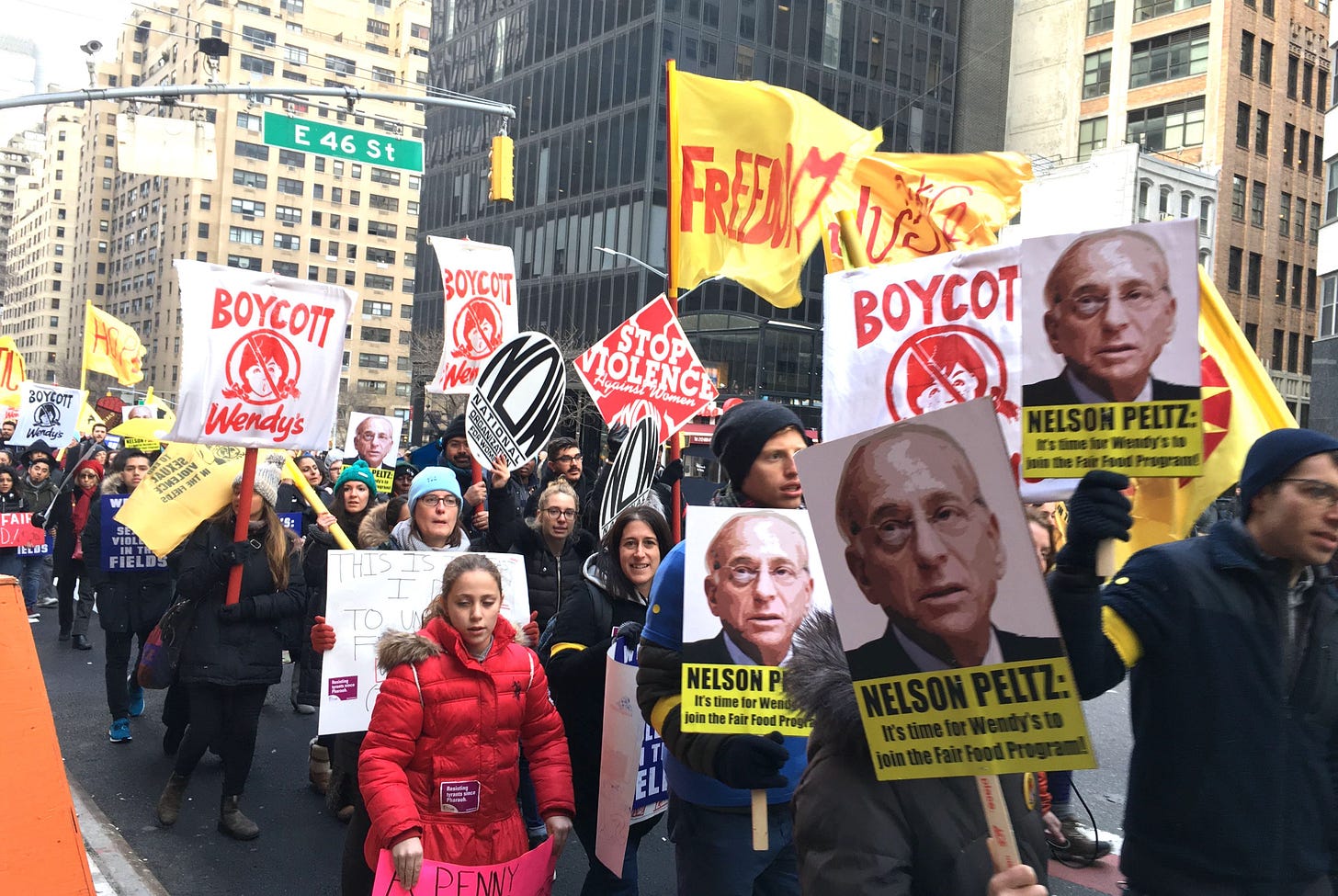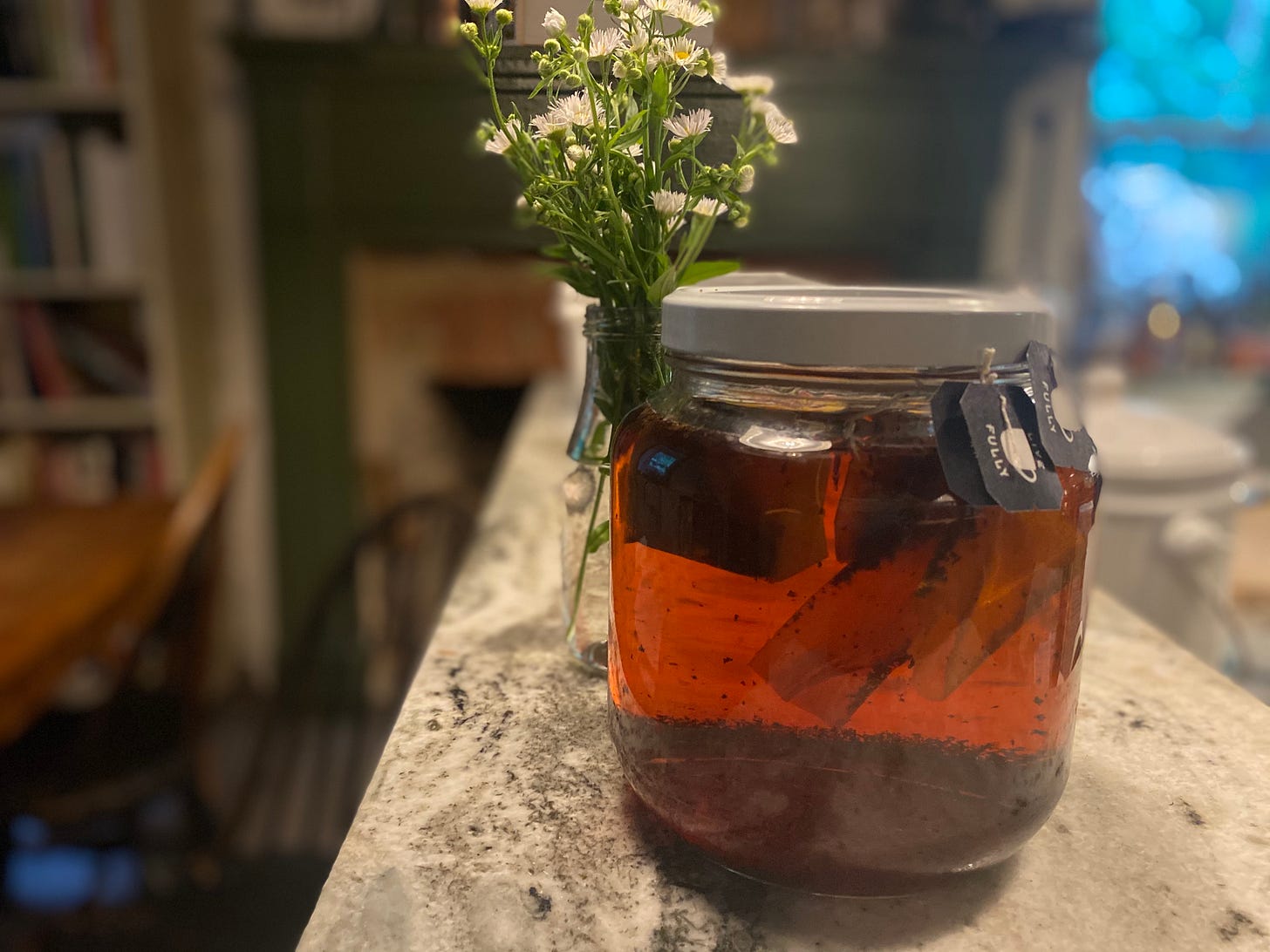95 percent of shareholders want Wendy’s to protect farmworkers. Will it?
Activist nuns and the future of the fast food industry’s biggest Fair Food Program holdout
Before the Coalition of Immokalee Workers (CIW) created the Fair Food Program, sexual assault, stolen wages, and even slave labor were serious issues that workers in Florida’s tomato fields often faced. Journalist Barry Estabrook documented the abuses and working conditions in his 2011 book Tomatoland.
But the Fair Food Program, created by the workers themselves, is widely credited as one of the most effective solutions ever implemented to protect farmworkers. It raises wages, educates workers on their rights, sets up a complaint system so they can easily report abuses without retribution, and includes audits of participating farms.
One of the key reasons the program has been so successful? Its creators decided the giant food companies that make billions off of the backs of vulnerable, low-wage workers should pay for it, via a small premium they pay for tomatoes. And over the years, they’ve signed on most of the biggest fast food chains and supermarkets, including McDonald’s, Burger King, Subway, Chipotle, Walmart, and Trader Joe’s.
Wendy’s, however, has long resisted pressure to join.
CIW has organized multiple boycotts and marches over the years, including a five-day fast on Park Avenue in Manhattan that I covered for Civil Eats in 2018, but the company hasn’t budged. Its leadership has said they don’t buy tomatoes in Florida so don’t need to join; critics say they started sourcing from Mexico—where reporters have documented horrific conditions on tomato farms—to avoid paying the premium.
Now, a new development in the long-running saga could have major implications for the future. In May, 95 percent of Wendy’s shareholders voted to approve a proposal demanding the company disclose detailed evidence of whether its current policies effectively protect workers in its supply chain from human rights violations.
“With this resolution, we demand to know if farmworkers in Wendy’s supply chain have the same right to complain as workers under the Fair Food Program, if they are protected from COVID-19 like workers in the Fair Food Program are, if Wendy’s has eliminated abuses like the Fair Food Program has,” said CIW’s Gerardo Reyes Chavez in a press release. “All workers deserve to have a safe workplace and to be treated with dignity, and shareholders deserve to know whether Wendy’s is protecting your investment by protecting workers in its supply chain.”
Here’s a quick rundown of why the proposal and vote is so significant, including a toe-dip into the world of shareholder advocacy, which is also used to push food and agriculture companies to make changes around issues like climate impact and animal welfare.
Unwrapped
First, a cool detail: Investor Advocates for Social Justice led the charge on behalf of a very interesting group of Wendy’s investors: the Franciscan Sisters of Allegany New York. Let’s call them “activist nuns,” a designation I like a lot due to my Catholic upbringing. (I had already fully abandoned the religion by age 16, but one Catholic movement I’ve always respected is liberation theology, which believes following Jesus’ example means fighting the oppression of the poor and vulnerable. Of course, the doctrine has mostly been rejected by the Church.)
The social justice-minded Sisters own stock in Wendy’s, and they care about the impact of their investments. They were concerned about the company’s labor practices and had heard about CIW’s efforts to get Wendy’s to join the Fair Food Program, so they decided to introduce the proposal.
On Wendy’s side, the company’s executives have made the case that their Supplier Code of Conduct is enough, and they don’t believe that they should directly pay one group of farmworkers more, because they are not employees. “Make no mistake: we believe that promoting human rights and safe working conditions in agriculture is vital. All of us in the food supply chain have an obligation to ensure that the products we sell have been raised and harvested in a responsible way,” Wendy’s Liliana Esposito wrote in 2016, while making the case for not joining the Fair Food Program. In 2020, the company launched a new corporate social responsibility program called “Good Done Right,” but the first report on that program doesn’t mention farmworkers. (It does announce Wendy’s first “Squarely Sustainable Supplier of the Year Award” went to Cargill, which activist groups have deemed the “worst company in the world” for its record of deforestation, child labor, and pollution in its supply chain, so…)
Back to the proposal: What makes it especially significant is that similar shareholder proposals were introduced twice in the past but Wendy’s successfully challenged them in a way that meant they were never voted on, explained Mary Beth Gallagher, executive director of Investor Advocates for Social Justice. In this instance, the company initially challenged it, but then something changed. The board of directors did an about-face and supported the proposal, which gave the signal to investors to vote yes.
Gallagher said it’s not entirely clear why that happened, but timing might have had something to do with it, “given that this proposal was about protecting workers, especially workers vulnerable to COVID-19 and in the midst of a racial justice uprising throughout the country.”
The proposal is modeled after the Fair Food Program’s requirements, with investors essentially setting up a choice for the company: do the work yourself or join the Fair Food Program and their team will do it for you.
“Maybe they'll be able to provide a disclosure to investors that shows what they're doing is equivalent, in which case we’ll feel reassured that their workers are safe and that their Supplier Code of Conduct is being effectively implemented. But because it's not a worker-driven system, it doesn't have an effective grievance mechanism, and there are no market-based consequences for compliance, our expectation is that they won't be able to match up,” Gallagher said. “So once we have that disclosure...it will give more information to stakeholders, workers, investors, and customers about why it's still very important for them to join the Fair Food Program.”
And the shareholder movement is bolstered by two other letters—one sent by a group of 100 big-time investors, another by US state treasurers—urging Wendy’s to join the Program.
“The company is receiving signals about what its investor community wants,” Gallagher said. “The Alliance for Fair Food and all of the campaigning around universities is also sending that signal, and we have a pretty clear unified voice around this mechanism being effective as the gold standard [for protecting farmworkers].”
In the past, shareholder advocacy has been effective at getting other food and agriculture corporations to move on human rights and climate change issues, but Gallagher also said it often leads to companies adopting policies that are unenforceable. For example, shareholders pushed Hershey’s to adopt a human rights policy, but the company is still linked to child labor in its supply chain.
That’s why Gallagher and others prefer Wendy’s join the Fair Food Program, which is fully enforceable. Still, if it doesn’t take that big step but does provide more information on how it’s accounting for the treatment of food workers in its supply chain, that will still feel like progress, she said.
“There's all this talk around stakeholder capitalism, and what we're trying to do is say, ‘Okay, show us. Show us that you really believe in this and that your business practices are aligned with it.’”
Wrapped up, to go
*The worker-driven Fair Food Program is widely credited as one of the most effective solutions ever implemented to protect workers on farms (and elsewhere) from human rights and labor abuses.
*While the other major fast food chains joined the Program long ago, Wendy’s has been a longtime holdout.
*Now, 95 percent of Wendy’s shareholders voted yes on a proposal to get the company to disclose how the company is protecting farmworkers in its supply chain (or join the Fair Food Program).
Still hungry?
The Ants and the Grasshopper. For Civil Eats, I interviewed the co-director of this new documentary on two farmers working to address climate change and other challenges in their community in Malawi. The film follows the women to the US, where they talk to farmers here about how the changing climate is disproportionately affecting African countries.


A side of policy
$4 billion for food. On Tuesday, the US Department of Agriculture (USDA) announced a big investment in the food system as part of President Biden’s “Build Back Better” initiative. USDA said it will use the $4 billion to “help to ensure the food system of the future is fair, competitive, distributed, and resilient; supports health with access to healthy, affordable food; ensures growers and workers receive a greater share of the food dollar; and advances equity as well as climate resilience and mitigation.” Details on what exact programs will look like are yet to be released, but they will revolve around four main priorities: production, processing, distribution and aggregation, and markets and consumers.
Currently devouring
The big bad farm? I loved Lela Nargi’s story published in The Counter this week. It examines new research on whether or not “small farms” matter (they do!) but also attempts to untangle some complex questions around whether “big or small” is the right question/distinction. These questions often get asked in one dimension, and this story pushed back on that framework.
Actually eating (er, drinking?)
I made my first batch of 2021 sun tea this week and it made me very happy. My mom always had tea brewing in the sunshine in the summer, and I try to follow her lead. If you’ve never done it, it’s as simple as putting a jar of water (cold or lukewarm) with tea bags out in the sun for a few hours, waiting for it to brew, and then putting it in the fridge when it’s done. You can also use a pitcher, but there are so many cicadas and other flying critters in my yard, a jar feels safer. (As you can see in my photo, one of the tea bags broke, so I just strained it after.)
Sun tea tastes very different compared to iced tea made by boiling water, brewing, and then chilling. It doesn’t have the bitterness or bite. I read that it’s because it brews slowly, similar to how cold brew coffee is distinct.
Let’s be friends
Follow me on Twitter and Instagram to continue the conversation. See you next week!





